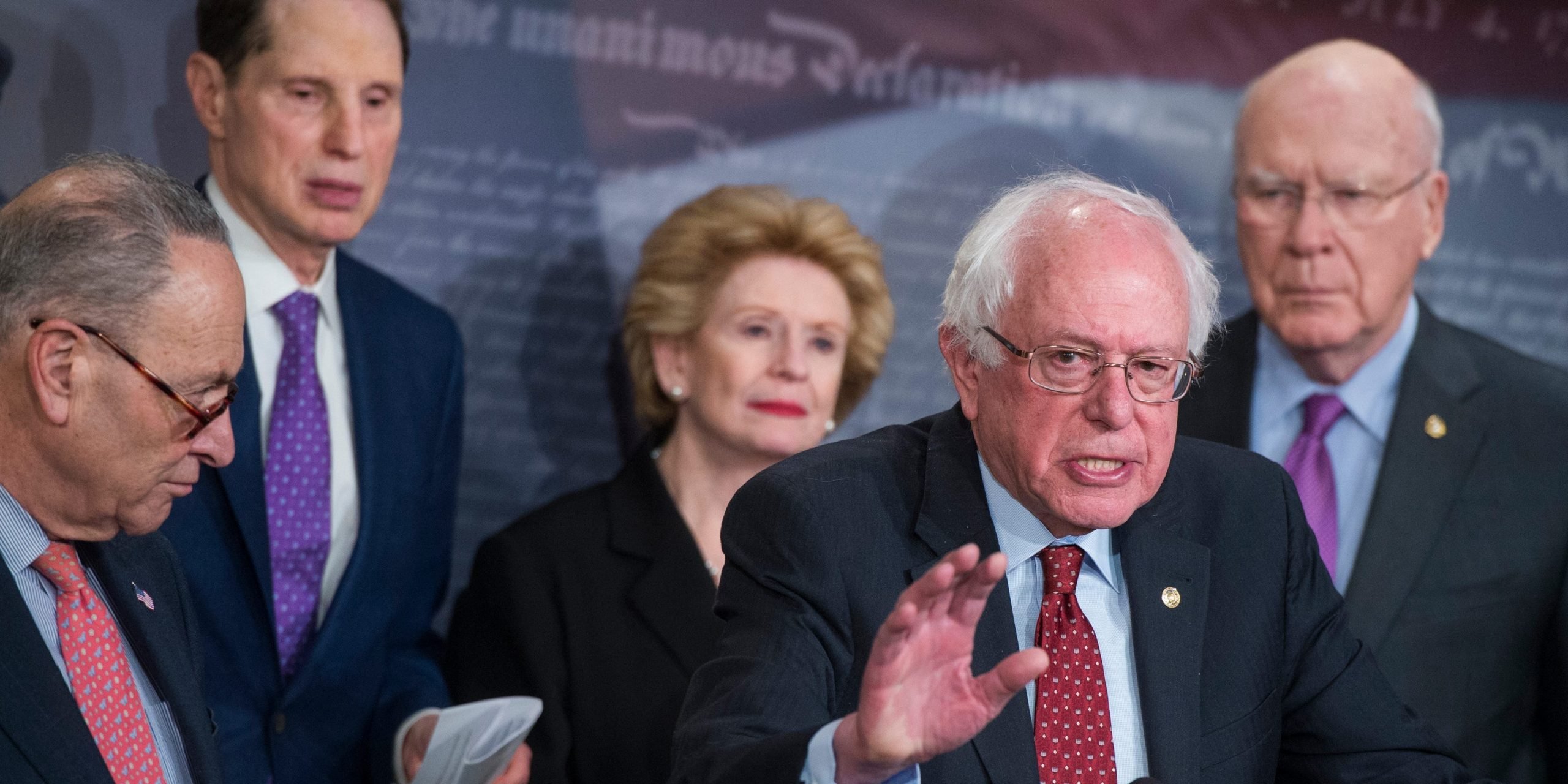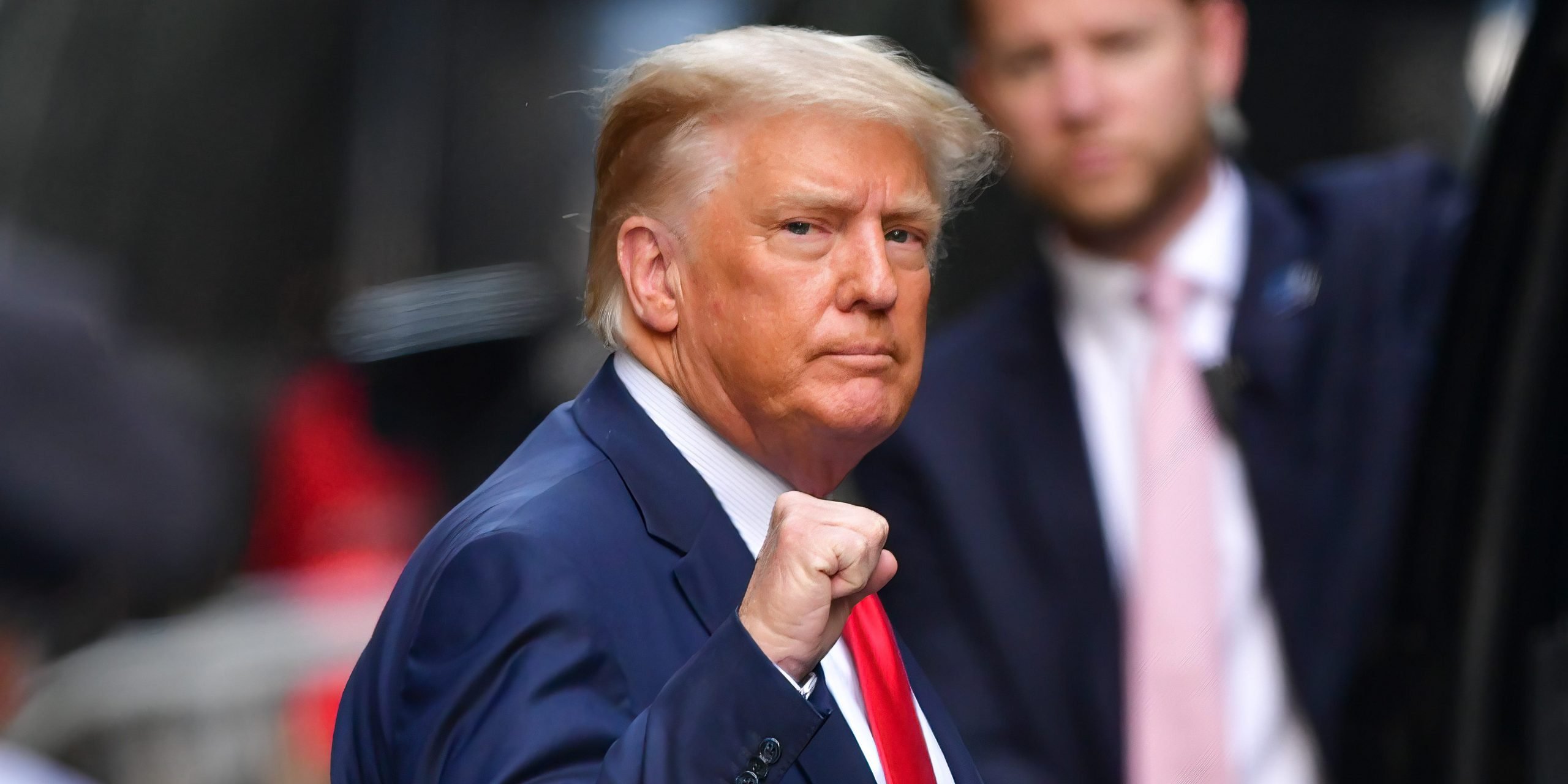
Anna Moneymaker/Getty Images
- Democrats are scrounging for new tax proposals given Sinema's resistance to rolling back the tax cuts Trump instituted in 2017.
- It may cause them to consider aggressive new taxes on billionaires, some of which haven't been done before.
- Sen. Mark Warner of Virginia told Insider it'd be a "great irony" if Democrats failed to roll back the Trump tax cuts
Congressional Democrats are in a tough bind.
They're scrambling to wrap up negotiations on President Joe Biden's economic spending plans before the end of the month, a feat that appears more unlikely with each passing day.
Internal divides are bogging down Senate Democrats over the size and scope of their social safety net bill aimed at expanding access to education, healthcare, and confronting the climate crisis. Sens. Joe Manchin of West Virginia and Kyrsten Sinema of Arizona are insistent that the price tag of the $3.5 trillion plan must come down to clinch their support.
A major part of the hold-up is Sinema's resistance to hiking tax rates on richer individuals and large corporations, a move that all but slams the brakes on Democrats' plans to roll back President Donald Trump's signature tax law. Democrats may be forced to abandon a central plank of their economic agenda to earn her vote in a 50-50 Senate.
Sinema's opposition to lifting tax rates cuts at least $700 billion in revenue that would be used to pay for social infrastructure. Democrats are floating alternatives that could hit billionaires even harder with a slew of of new tax increases on capital gains, along with stock buybacks.
Howard Gleckman, a tax expert at the nonpartisan Tax Policy Center, described the current situation facing Democrats as "an odd thing."
"I don't know what's in Kyrsten Sinema's head," he said in an interview. "In some ways, the other proposals are a much more direct tax increase on high-income people. So if what she's trying to do is protect the wealth of very rich people, pushing Democrats to a mark-to-market structure or even a wealth tax actually makes that harder, not easier."
Sen. Ron Wyden, the chairman of the tax-writing Senate Finance Committee, argued that Democrats have plenty of alternatives to choose from, including one of his own to tax capital gains. "We are ready to go now," he told Insider.
How Democrats may sidestep Sinema and embrace new taxes on wealth

Tom Williams/CQ Roll Call
Senate Democrats can't spare any votes in their endeavor to turn Biden's economic plans into law over united Republican opposition. The tricky political maneuvering required to get Sinema's vote is already infuriating the party's progressive wing.
"It would be outrageous to not include something that so desperately needs to be done, that's the most popular part of this package, that all of us ran on," Rep. Pramila Jayapal of Washington, who chairs the Congressional Progressive Caucus, told reporters on Thursday.
But Sinema's position is causing Democrats to dust off older ideas in search for back-ups. Chief among them is a "Billionaire's Income Tax" that's being authored by Wyden, which targets unrealized gains on assets. Importantly, it means assets that haven't been sold - but whose value still went up - would be taxed annually. It's based on an earlier proposal from 2019 and an updated version still hasn't been released.
For the wealthy, assets are a much more sizable part of income compared to the typical worker. If you work a salaried job, you probably pay an income tax. Meanwhile, if you're a billionaire holding profitable stocks, you're paying a preferential tax rate if you decide to sell and won't pay a dime until you do.
An analysis from the left-leaning Americans for Tax Fairness finds that Wyden's proposal would apply to just .0005% of households - the wealthiest slice of taxpayers. Importantly, Wyden's proposal has Biden's blessing.
Gleckman projected the plan could raise between $500 billion to a $1 trillion in revenue depending on details like which financial instruments are taxed. But he said setting up an apparatus to carry it out is easier said than done since it hasn't been implemented in a broad scale in the US before.
"You would have to create a completely new structure to do this," he said. "It's time-consuming, and it's complicated."
Already, at least one Democratic senator says he's uneasy about implementing a largely untested idea to pay for their spending plans. "I think anytime you get into stuff that's not proven in the tax code it becomes a bit dangerous," Sen. Jon Tester of Montana told the Wall Street Journal's Andy Duehren.
Other measures to make up for lost revenue include stepping up IRS enforcement and an international tax overhaul, a Senate Democratic aide familiar with discussions recently told Insider. They're also eyeing imposing taxes on companies that buy their own stock to benefit shareholders.
The 'great irony' that Trump's tax cuts may be here to stay

James Devaney/GC Images
Democrats in both the House and Senate are betting that Sinema will ultimately budge in her ongoing negotiations with the White House. The Arizona Democrat has perplexed many in her party, given her 2017 vote against the Trump tax law.
"My hope is that person will change her mind," Sen. Mazie Hirono of Hawaii, said, referring to Sinema. "Why should billionaires pay less in taxes than you or me?"
"I'm not giving up the possibility of some rate increases," Sen. Tim Kaine of Virginia told Insider, adding that a deal on the price tag would help settle much of the disputes among Democrats around tax increases.
But the possibility exists that swaths of the Trump tax law - which slashed the corporate tax rate to 21% from 35% and many experts say accelerate inequality - will remain untouched during a period of unified Democratic rule.
"Boy, oh boy, that would be a great irony - if a Democratic president, House and Senate embraced the 2017 tax cuts," Sen. Mark Warner of Virginia told Insider.
